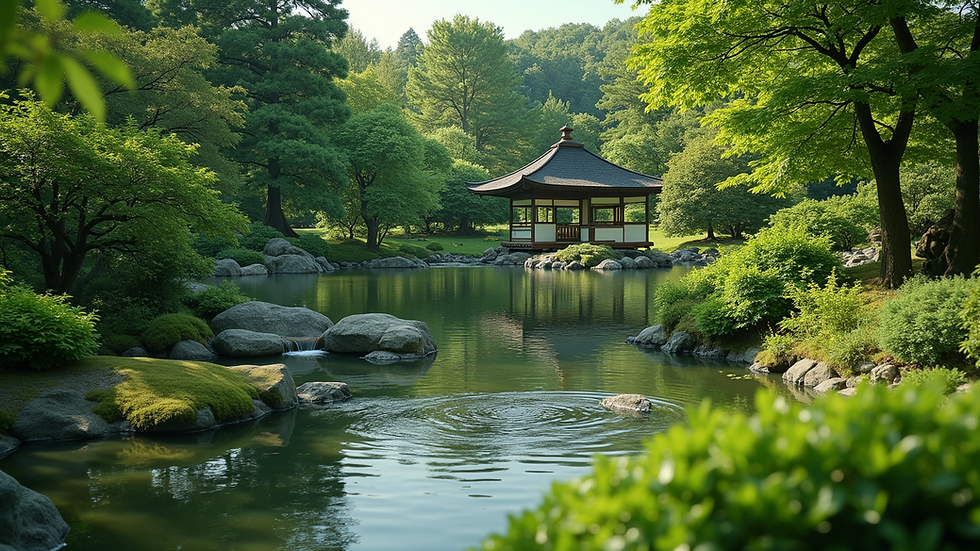The Role of Ikigai in Japanese Culture and Its Relevance in Finding Purpose in Our Daily Lives
- Mr. Keys
- Oct 21, 2025
- 4 min read
Updated: Dec 30, 2025
Ikigai: Discovering Your Purpose in Life
Ikigai, a Japanese term meaning "a reason for being," has become increasingly popular in recent years. This concept, deeply rooted in Japanese culture, goes beyond being a mere philosophical idea. It encapsulates a way of life that emphasizes the pursuit of purpose and fulfillment. In this post, we will discuss the significance of ikigai in Japanese culture and share how we can adopt its principles to enhance our daily lives and overall well-being.
Understanding Ikigai
At its essence, ikigai is the overlap of four crucial elements: what you love, what you excel at, what the world needs, and what you can earn. These four components create a sense of purpose that motivates individuals to live fulfilling lives. In Japan, pursuing ikigai is seen as vital for happiness and longevity.
For example, studies show that individuals who identify their ikigai are often happier and live longer. In Japan, this pursuit is an essential part of everyday life. People consider their interests and skills in relation to society's needs, fostering a sense of belonging. This connection is especially important in a culture that highly values community and relationships.
The Cultural Significance of Ikigai
In Japanese society, ikigai is more than just a personal search; it represents a collective belief. Many Japanese people view having a purpose as essential for overall well-being and longevity. This belief is especially visible among the elderly in Japan. For example, the small island of Okinawa has one of the highest life expectancies in the world, with many residents living well into their 100s. Their active lifestyles and sense of purpose contribute greatly to their longevity.
Research indicates that people with a defined sense of ikigai experience lower stress levels and higher satisfaction in life. This culturally rooted perspective highlights the importance of social connections, both with family and in the community, as key components of discovering one's ikigai.
How to Discover Your Ikigai
Finding your ikigai can feel challenging, but it can also be a rewarding journey. Here are practical steps to help you uncover your purpose:
Self-Reflection
Dedicate time to reflect on your interests. What activities make you lose track of time? For instance, if cooking brings you joy, consider how you might incorporate it into your career or volunteer work.
Identify Your Strengths
Think about what you excel at, whether it's writing, teaching, or analytical thinking. For example, if you are skilled in graphic design, explore how you can use this gift to help local charities with their marketing materials.
Assess the Needs of the World
Look for opportunities in your community. Are there causes that resonate with you, like environmental issues or education? Understanding where you can contribute can guide you toward your ikigai.
Explore Career Opportunities
Align your passions and skills with possible career paths. For instance, if you love gardening and are knowledgeable about sustainable practices, you might pursue a career in community gardening or environmental education.
Experiment and Adapt
Be open to trying new experiences. Your ikigai might evolve as you grow and change. Participating in a painting class or volunteering at an animal shelter could uncover new interests and talents.
By following these steps, you can start to outline your unique ikigai and weave it into your everyday life.
Applying Ikigai to Daily Routines
Bringing ikigai into your daily life can shift your perspective and enhance your overall experience. Here are some effective ways to integrate ikigai into your routine:
Set Daily Intentions
Begin each day with an intention that reflects your ikigai. This might be dedicating an hour to a favorite hobby or committing to volunteer at a food bank each month.
Practice Mindfulness
Engaging in mindfulness practices like meditation or journaling can help you connect with your ikigai. These activities encourage self-awareness and reflection, guiding you to align your daily actions with your life's purpose.
Foster Connections
Connect with others who share your interests or values. Building a supportive community not only enriches your sense of purpose but also helps to keep you motivated and inspired.
Embrace Lifelong Learning
Always seek chances for growth and learning. Whether taking an online course or joining a book club, expanding your knowledge can clarify your ikigai and open up new possibilities.

The Impact of Ikigai on Spiritual Well-Being
Adopting the principles of ikigai can lead to significant spiritual growth. When people align their lives with their purpose, they often feel a deeper connection to themselves and their surroundings. This sense of connection can foster peace and fulfillment, going beyond material achievements.
Furthermore, the pursuit of ikigai encourages individuals to make positive contributions to society. Acts of kindness and service not only help others but also enrich your own life, creating a positive cycle.
Embracing the Journey
Ikigai is a powerful concept with profound significance in Japanese culture. By understanding and integrating these principles into our lives, we can find purpose and enhance our everyday experiences.
In an often chaotic world, discovering your ikigai can provide clarity and direction. Whether through self-reflection, community involvement, or personal growth, seeking your ikigai is a journey worth taking.
With a commitment to embrace the principles of ikigai, we can craft lives filled with passion, purpose, and connection. Enjoy this journey, and you may find your ikigai waiting to be unveiled.
The Aloha Spirit and Ikigai
Incorporating the Aloha Spirit into your ikigai journey can enhance your experience. The Aloha Spirit emphasizes love, compassion, and mutual respect. By embracing these values, you can deepen your connections with others and enrich your pursuit of purpose.
Imagine starting your day with a warm smile, sharing kindness with those around you. This simple act can create ripples of positivity in your community. When you align your ikigai with the Aloha Spirit, you not only uplift yourself but also inspire others to seek their own purpose.
Conclusion
Finding your ikigai is not just about personal fulfillment; it's also about contributing to the greater good. By understanding your passions, strengths, and the needs of the world, you can create a life that resonates with your true self.
So, let's embark on this journey together! Embrace the principles of ikigai and the Aloha Spirit. Together, we can create a life filled with meaning, joy, and connection. Your ikigai is waiting—let's uncover it!


Comments